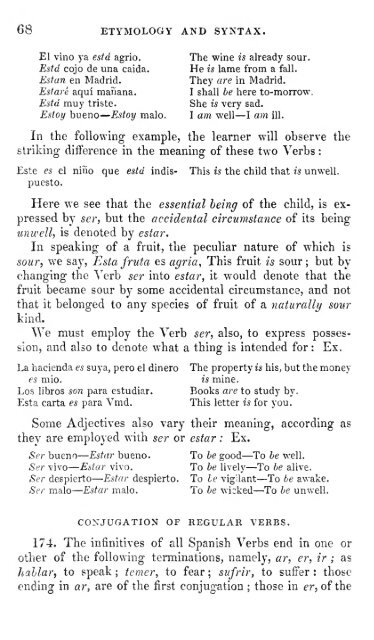A concise and simplified grammar of the Spanish language
A concise and simplified grammar of the Spanish language
A concise and simplified grammar of the Spanish language
Create successful ePaper yourself
Turn your PDF publications into a flip-book with our unique Google optimized e-Paper software.
—<br />
68 ETYMOLOGY AND SYNTAX.<br />
El vino ya estd agrio. The wine is already sour.<br />
Estd cojo de una caida. He is lame from a fall.<br />
Estan en Madrid. They are in Madrid.<br />
Estaré aquí mañana. I shall be here to-morrow.<br />
Está muy triste. She is very sad.<br />
Estoy bueno—Estoy malo. I am well—I am ill.<br />
In <strong>the</strong> following example, <strong>the</strong> learner will observe <strong>the</strong><br />
striking diíFerence in <strong>the</strong> meaning <strong>of</strong> <strong>the</strong>se two Verbs :<br />
Este es el niño que estd indis- This is <strong>the</strong> child that is unwell,<br />
puesto.<br />
Here we see that <strong>the</strong> essential being <strong>of</strong> <strong>the</strong> child, is expressed<br />
by ser, but <strong>the</strong> accidental circumstance <strong>of</strong> its being<br />
unwell, is denoted by estar.<br />
In speaking <strong>of</strong> a fruit, <strong>the</strong> peculiar nature <strong>of</strong> which is<br />
sour, we say, Esta fruta es agria. This fruit is sour; but by<br />
changing <strong>the</strong> Verb ser into estar, it would denote that <strong>the</strong><br />
fruit became sour by some accidental circumstance, <strong>and</strong> not<br />
that it belonged to any species <strong>of</strong> fruit <strong>of</strong> a naturally sour<br />
kind.<br />
We must employ <strong>the</strong> Verb ser, also, to express possession,<br />
<strong>and</strong> also to denote what a thing is intended for : Ex.<br />
La hacienda es suya, pero el dinero The property is his, but <strong>the</strong> money<br />
es mio. is mine.<br />
Los libros son para estudiar. Books are to study by.<br />
Esta carta es para Vmd. This letter is for you.<br />
Some Adjectives also vary <strong>the</strong>ir meaning, according as<br />
<strong>the</strong>y are employed with ser or estar : Ex.<br />
Ser bueno— Estar bueno. To be good—To be well.<br />
Ser vivo Estar vivo. To be lively—To be alive.<br />
Ser despierto—Estar despierto. To le vigilant—To be awake.<br />
Ser malo—Estar malo. To be wicked—To be unwell.<br />
CONJUGATION OF REGULAR VERBS.<br />
174. The infinitives <strong>of</strong> all <strong>Spanish</strong> Verbs end in one or<br />
o<strong>the</strong>r <strong>of</strong> <strong>the</strong> following terminations, namely, ar, er, ir ; as<br />
hablar, to speak ; temer, to fear ; sufrir, to suffer : those<br />
ending in ar, are <strong>of</strong> <strong>the</strong> first conjugation ; those in er, <strong>of</strong> <strong>the</strong>

















